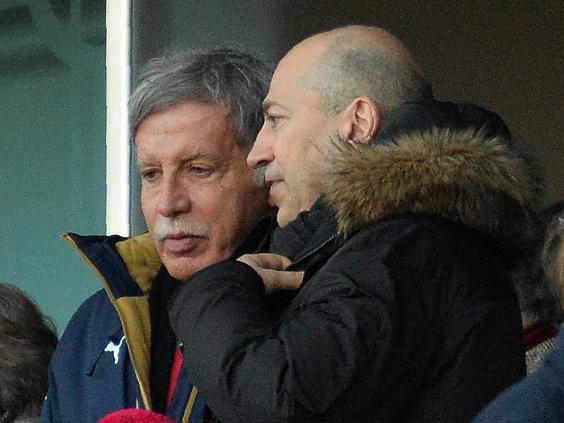Wolves sack manager Walter Zenga after only 87 days in charge
 There was just one moment of disruption at Arsenal’s
Annual General Meeting on Monday, one quick flicker when the
frustrations of fans threatened to drive the morning off its well-marked
path. Sir Chips Keswick, Arsenal chairman, was proposing the fourth
formal resolution of the morning, to re-elect majority shareholder Stan
Kroenke as a director.
There was just one moment of disruption at Arsenal’s
Annual General Meeting on Monday, one quick flicker when the
frustrations of fans threatened to drive the morning off its well-marked
path. Sir Chips Keswick, Arsenal chairman, was proposing the fourth
formal resolution of the morning, to re-elect majority shareholder Stan
Kroenke as a director.There were a few hands for the resolution and a few hands against, but enough that Sir Chips had to count them. Enough hands, in fact, that he had to threaten his nuclear option, a full poll of shareholders, with the warning that he had proxies accounting for 79 per cent of the shareholding on his side. With few shareholders keen to waste time taking on Kroenke, the vote to re-elect him was passed at the second attempt, without the need for a futile full poll.
That was as feisty and challenging as the whole session got. In recent years these AGMs have bubbled away furiously with a whole year’s worth of anger and grievance. They offer a rare chance to confront Kroenke, Sir Chips and Ivan Gazidis, rather than merely piling it all on Arsene Wenger at every bad result. But this was not that. It was a long way away from the tetchiness of last year, or the rage in 2012 the morning after a home defeat to Schalke. It was, according to plenty of annual attendees, the calmest quietest AGM of recent years.
It certainly helped that Wenger was the star of the show here, giving a funny heart-felt speech without notes, in complete command of the crowd. He was presented with an artistic montage of all of his 210 Arsenal players at the start, a moment that united the room behind him, lancing much of the disaffection. Even Kroenke, not especially given to public statements, said a few words, thanking Wenger for his service, saying that he was the reason the Kroenke family bought into the club. It was not a taxing outing for the majority shareholder.
These events, in theory, are meant to be about democracy and accountability, an opportunity for shareholders to put their questions and criticisms to the board. But this was so effectively stage-managed that it felt more like a political party conference, with the key messages and brand values – “the self-sustaining strategy”, “the virtuous circle” – driven home from the front of the room.
So when the shareholders’ questions came, whether pre-vetted or coming from the floor, they were batted away with ease. Gazidis took the opportunity to endorse the idea of charity boxes for the Arsenal Foundation, to restate that Arsenal were “open-minded” about safe standing and that the club were still weighing up the case for a bespoke stadium for the women’s and youth teams.
Even the last two questions from the floor were more critical of other fans – for not staying until the end of the games, and for drinking too much at away matches – than they were of the club. It gave Gazidis another chance to reiterate the importance of unity, of how Arsenal needs the fans to believe in the players and to inspire them in return. But for as long as Arsenal are second, off top on goal difference alone, unbeaten since opening
day, that politics will stay this placid. Unity is harder when you are losing.


Comments
Post a Comment